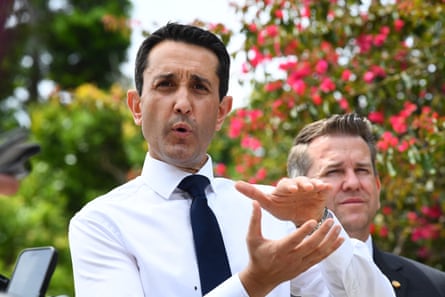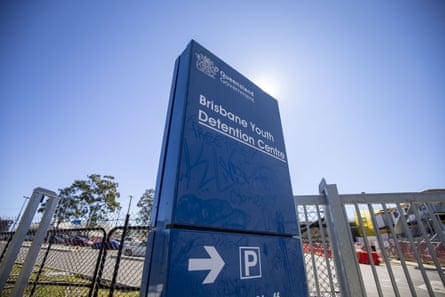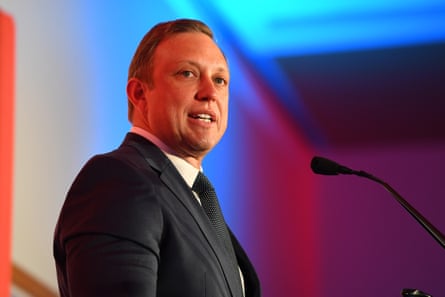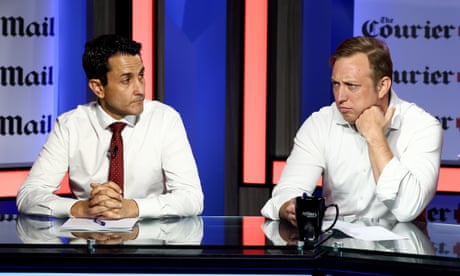Extract from The Guardian
While data suggests youth crime rates are at near-record lows, it’s become a totemic issue in the election campaign and that has Indigenous academics worried.
Fri 18 Oct 2024 01.00 AEDT
The day after the Liberal National party announced its centrepiece youth justice plan – to sentence children to “adult time” – the opposition leader, David Crisafulli, flew to north Queensland to campaign.
At his press conference, Crisafulli introduced an 81-year-old woman whose car and purse were stolen in the Townsville suburbs. He put his hand on her shoulder as she recounted being confronted and pushed to the ground by a group of “mongrels”.
“All these people should be locked up and then throw the key away,” the woman said.
“If they repeat, get rid of them altogether. Put them in a coffin. That’s my way of thinking. I know it’s not right, but there’s just too much of that going on.”
Youth crime has become a totemic issue in Queensland ahead of next week’s state election; critical to the LNP’s dominant lead in opinion polls, and central to its pitch to voters.
But while data suggests youth crime rates are at near-record lows, an examination of the LNP’s rhetoric and campaigning tactics shows how the opposition has pushed the notion of a “youth crime crisis”, then pitched itself as a hardline solution.
Indigenous academics and other experts this week accused Crisafulli of “dog whistling” and sowing division over the LNP’s campaign slogan, labelling kids a “generation of untouchables”. Concerns are mounting that the political debate has taken a dangerous turn.
“It’s scary to see some of the rhetoric,” says Kevin Yow Yeh, a Wakka Wakka and South Sea Islander man, and a principal researcher at the Institute for Collaborative Race Research.
“I’m deeply concerned about the safety of all young people. I’m not sure people who are using this rhetoric are appreciating the very real world consequences.”
The term has been used regularly by the opposition leader and LNP candidates. It has appeared in television advertisements and other campaign material to refer to young people in the justice system. Crisafulli and the LNP’s use of the term does not refer specifically to Aboriginal children.
But online the term “untouchables” is often used in anti-crime communities – including before it was used by the LNP – as a reference to Indigenous children.
The deputy opposition leader, Jarrod
Bleijie, said the party was using the term in reference to all repeat
young offenders and would continue to do so.
“We have a repeat generation of young offenders who think they are
untouchable by the laws, because Labor weakened the youth justice laws,
and we will continue to say it,” he said on Thursday. “When we refer to
it, we refer to all young offenders.”
Fear and panic take hold
Crisafulli began spruiking Queensland’s “youth crime crisis” in early 2021, a few months after becoming opposition leader.
A search of Hansard records and LNP media statements shows the term was used a handful of times prior to the 2020 state election; but from March 2021 onwards, the phrase began to be repeated regularly – hundreds of times – by shadow ministers and opposition MPs as they sought to make youth justice a political issue.
Several serious high-profile incidents, and some data suggesting an increase in recidivism rates and spikes in certain offences, have helped the notion of a crimewave take hold.
But claims that the situation represents a crisis is refuted by most experts, including the former children’s court president John Robertson, and is not supported by statewide crime data, which shows youth crime rates at near-record lows.
Crisafulli has claimed that Labor’s changes to the Youth Justice Act in 2015 “watered down” consequences for young people and created a “generation of untouchables” or “repeat untouchables”.
But since 2012-23, the rate of unique child offenders has decreased by 18%. Queensland also locks up record numbers of children – more than most other states and territories combined, and more than the state ever has before.
In the face of the evidence, fear and panic about youth crime has taken hold. Polling has shown the LNP on course to win the state election, largely on the back of swings in regional areas, where law and order concerns are most prominent.
In four years as opposition leader, Crisafulli’s tactics have been to amplify individual incidents and community discontent. At almost every press conference he holds about youth crime, the opposition leader is accompanied by a victim who is encouraged to tell their story.

Last week, after the LNP announced it would establish “reset” camps for at-risk young people who have never committed a crime, the party’s campaign team distributed CCTV footage of a break-in to media outlets.
Crisafulli’s social media videos include clips of him reacting with disgust to TV news reports about crime.
He often posts campaign videos direct to Facebook community anti-crime groups.
“G’day it’s David Crisafulli here, I’m the opposition leader in Queensland,” says one video from March, posted in multiple crime groups.
“Every single day we are contacted by locals in your area impacted by crime. It’s out of control and it’s getting worse.”
Young people at risk
Amid the heightened political debate and community sentiment about youth crime, concerns are growing that the narrative places young people at risk. Children living in care homes have been the subject of death threats, and vigilantes have surrounded the homes of Aboriginal children and torched the home of two girls accused of a serious assault.
“You only have to look at what happened in Rockhampton, [where a group of vigilantes] went to the house where they thought a young person was living and … it’s scary,” Yow Yeh says.
“When we look at the stats and the research that comes out we know that youth offending has been decreasing and it makes you wonder what political parties are wanting to achieve when they do [claim crime has increased].
“We know the most vulnerable in our society are our young people. It’s scary to think that people will run with these notions and take things into their own hands.
“It almost gives these vigilante groups permission to be more brazen and emboldened in their actions.”

The public commentary often speaks about youth offenders in quite general terms. On social media, debate in anti-crime groups can be highly racialised and more extreme. Indigenous children are referred to by codewords: “skinny ankle kids” and “untouchables”.
Dr Bartholomew Stanford, a Torres Strait Islander man and political science lecturer at Griffith University, says Indigenous Australians had been demonised through colonial settlement as “violent and uncivilised”.
“Today that perspective helps to perpetuate stereotypes about [them], the most egregious being that Indigenous youth have some propensity towards crime,” he says.
“The issue is socioeconomic and is exacerbated through their continued marginalisation from society.”
The LNP and Crisafulli were offered the opportunity to comment, but did not respond to questions.
‘Cruel’ and ineffective
The LNP’s youth crime campaign has been so successful, it has almost become politically poisonous to challenge the notion that crime is out of control.
Last year, victims of crime called for the Labor MP Don Brown to be sacked for comments claiming youth crime was “a media beat-up”. He was quickly shot down by senior ministers.
“You will have all seen me acknowledge, repeatedly acknowledge, how real the community’s concern is,” Steven Miles, the then deputy premier, said in response.
When Miles told Guardian Australia that TV news was “addicted to CCTV footage of crime”, an image of the headline was posted to Instagram by Crisafulli.
“Lives have been lost, Queenslanders are living in fear, and this Premier thinks the Youth Crime Crisis is a media beat-up,” he said.

With the opposition leading in the polls, the state government has responded with piecemeal pivots to the right. It has twice suspended the Human Rights Act, to introduce a criminal offence for young people breaching bail conditions, and to allow children to be lawfully held in police watch houses.
Earlier this year the government removed the international principle of “detention as a last resort” from the Youth Justice Act. Yow Yeh says both parties’ rhetoric and policies have been concerning.
The LNP is now proposing sentencing children as adults – “adult time for adult crime” – and sending at-risk children with no criminal record to “reset” boot camps. Both policies have been labelled “cruel” and ineffective.
In Ipswich on Tuesday, Crisafulli told reporters on the campaign trail that Labor MPs were still “burying their heads in the sand”.
“I’m sorry but I’m going to call it out,” Crisafulli said.
“We are now past the halfway mark of the campaign and the government has not said ‘youth crime crisis’ once.”
Crisafulli seems intent on saying it, over and over again, until polling day.

No comments:
Post a Comment